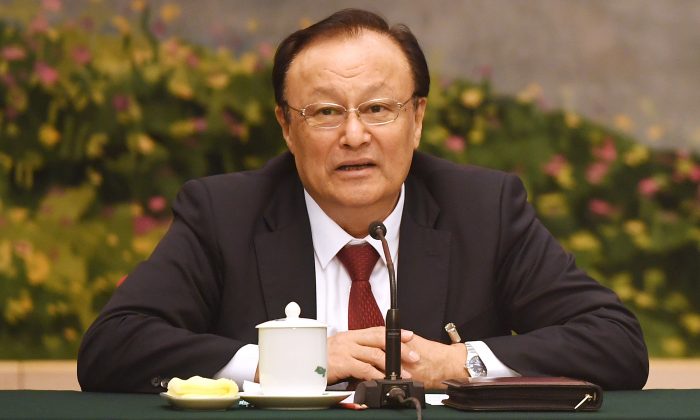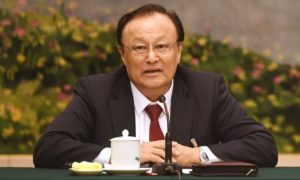PRESS RELEASE: China Must Allow Unfettered Access to All Political Indoctrination Camps in East Turkistan

World Uyghur Congress, 7 January 2019

The World Uyghur Congress implores the international community to press for unfettered access to East Turkistan as well as to all camps where up to two million Uyghurs and other Turkic groups are arbitrarily held, following a recent indication from a Party member that the UN may be granted access.
In a statement on January 6, the region’s governor, Shohrat Zakir, remarked to press that, “We will welcome any of the UN experts to visit Xinjiang to know the real situation and we hope their comments will be based on facts and ground realities.”
Despite mounting evidence compiled for over a year showing over one million arbitrarily detained and suffering unimaginable rights abuses, Zakir provided the Party’s oft-repeated narrative about the camp system, calling them ‘vocational training centers’ meant for skills training.
Uyghur Congress President, Dolkun Isa, in response to reports of the possible visit remarked that, “We know that China likes to show-off its success, so why did it take so long to invite observers to East Turkistan? If these so-called ‘vocational training centers’ existed since 2017, why are we only hearing about them now?”
Isa continued by pointing out that, “It’s so clear what China’s game has been all along. The international community has to be very careful not to fall for it.”
The political indoctrination camps were opened on a large-scale in April 2017 and have been well-documented by civil society, journalists, academics as well as Uyghurs themselves in a growing body of eye-witness testimony. The camps are extralegal facilities, as detainees are not formally charged, but are detained primarily for communication or travel abroad, or expression of religious sentiment.
The camps include ideological study sessions, forced renunciation of religious beliefs, as well as forced marches and chants. Torture has been reported from many former inmates as have suicide attempts and numerous mysterious deaths so far. The camps stand as the culmination of many other policies attempting to socially re-engineer the entire Uyghur ethnic group.
Zakir’s statement follows a clear narrative shift from complete denial to an effort to normalise the camps. The government made a slight admission of the existence of the camps during a critical review by the UN Committee on the Elimination of Racial Discrimination in August 2018.
On October 16, Zakir made the first clear admission of the camps, which was followed the same week by a 15-minute long CCTV video report inside a facility where Uyghur students are seen being taught Mandarin, Chinese law, and job skills. In the segment, Uyghurs speak to reporters about how the facility has led them down the correct path after having been influenced by extremism.
Recent reporting from Radio Free Asia and The Epoch Times has also indicated that the Chinese government may be preparing for international inspections by improving the appearance of the camps and having detainees in some locations sign confidentiality agreements regarding camp details.
Any visit from international observers must be undertaken on clear conditions, given that China continues its attempts to normalise the camps and that previous visits from UN independent experts have been met with serious impediments.
The most recent visit by a UN expert was made by Philip Alston, Special Rapporteur on Extreme Poverty and Human Rights, in August 2016, who released a detailed report noting positive steps taken by China in fighting poverty, but also raised concerns about, “[V]ery rapidly shrinking space for the expression of views that differ from those of the [Communist] Party.”
In his report, Alston expressed concern for Jiang Tianyong, a Chinese lawyer who was detained after his visit in an apparent act of reprisal for his cooperation with the UN during Alston’s visit. The Chinese government was harsh in its response, stating that the UN expert had “[O]verstepped his mandate and meddled with China’s judicial sovereignty.”
Previous Rapporteurs who have visited China in the past have complained about serious restrictions on access, including UN Special Rapporteur on Torture, Manfred Nowak, whose request took nearly a decade to be accepted.
In his concluding report from 2005, Nowak felt “[C]ompelled to point out that security and intelligence officials attempted to obstruct or restrict his attempts at fact-finding,” and that, “[…] a number of alleged victims and family members, lawyers and human rights defenders were intimidated by security personnel, placed under police surveillance, instructed not to meet [him], or were physically prevented from meeting with him.” Nowak also observed, “a palpable level of fear and self-censorship,” when meeting with detainees.
According to the OHCHR, China now has twenty open requests and reminders from Rapporteurs and Working Groups for country access to review thematic human rights issues.
If the UN is allowed to visit the region, observers must take into consideration that from the outset, Uyghurs with a history of even the mildest criticism of the government have already been imprisoned. Uyghur academic, Ilham Tohti – detained nearly five years ago and sentenced to life in prison – worked openly and constructively bridge the growing gap between Uyghur and Han.
Ahead of a possible visit, we call for several strict criteria to be met:
- Observers must be granted full access to prisons and other detention facilities, including what are labelled as ‘vocational training centers’.
- Observers must be allowed private access to individual victims with guarantees against reprisals for family members and legal representatives.
- Observers must be granted follow-up access to ensure compliance with recommendations.
Based on widely available evidence, China’s approach to Uyghurs over the last two years amounts to crimes against humanity. We therefore urge the international community not to allow China to use this as an opportunity to continue to normalise the mass arbitrary detention of millions of people.

